
A couple of weeks ago the news was filled with the story of a mother of a 1 year-old baby that tried to drive into the White House. After a chase through Washington DC, she was shot and killed. What was the media’s focus? The mother suffered from postpartum depression.
Time and time again I hear the media talking about postpartum depression. Are they trying create awareness and tell the public what it is? No! They talk about it when there is a serious (and rare) event that ends in a harmful way.
It truly makes me angry. As if there was not enough stigma in this world around postpartum depression as it is, the only times you hear about this condition in the media is when something like this happens. Something that most likely wasn’t even a case of just postpartum depression (PPD) or even PPD at all. So women, that are so many times already afraid to admit their postpartum mood, see these stories on the evening news and are either afraid that they too will do something extreme or otherwise think what they are feeling is probably something else other than PPD. This negative media coverage of PPD needs to stop. It’s not helping women seek help when they need it. On the contrary. It makes them feel more ashamed to talk about it openly and the isolation just makes it worst.
Let’s get back to the basics here. Let’s start with setting things straight and saying: as much as a child is wanted, it is NORMAL to have some mood changes in the postpartum period.
Here is a very brief description of the three most common mood disorders seen in the postpartum period.
BABY BLUES
– 50-85% of mothers in the first two weeks experience mood fluctuations like irritability, anxiety, and emotional reactivity. Usually symptoms are mild and go away on their own.
POSTPARTUM DEPRESSION
– 13% of women will experience PPD in the first year of a child’s life, usually starting after 4 weeks.
– Symptoms are moderate to severe and can include: depressed mood, anxiety, feelings of guilt, insomnia or hypersomnia, fatigue, negative feelings towards the baby, and in some cases, suicidal ideation.
POSTPARTUM PSYCHOSIS
– 0.01% of women can experience this in the first 3 months postpartum
– Symptoms are severe and considered a psychiatric emergency and can include: delusions, hallucinations, agitation, cognitive impairment, and disorganized behavior.
– Typically, this occurs in women with history of mental illness.
So after reading this description, I would like to point out that most of the cases labeled as “postpartum depression” in the media, are most likely not PPD, but postpartum psychosis, a rare, severe postpartum psychiatric disorder. Another possible scenario is that these women happened to have been diagnosed with PPD but also suffered from other mental health issues like psychosis, bipolar disorder, schizophrenia, etc., but somehow, the PPD is the diagnosis that the media focused on. Either way, what is coming out to the public is: PPD is a really horrible thing that makes you do very crazy things, like driving into the White House with a 1-year-old in the back seat. We need to stop this negative publicity. Specially, because if you look closely to one of the symptoms of actual PPD, you will find “FEELINGS OF GUILT”. So, with all this negative rep around PPD in the media, we are only feeding into one of the symptoms that already exists in PPD. We are making new mothers, that already feel guilty about their mood, in what is supposed to be the happiest times of their lives, feel afraid to admit to friends, family, and doctors that they feel this way, because “what if I end up like that lady on TV?”.
It’s just a very negative cycle that needs to stop. And the media, should do women and society a favor and do two things:
1. Get your facts straight when reporting on Mental Health diagnosis on national television;
2. Use your power to give valuable information to people who need it. Help spread the word about PPD. Help normalize it and not stigmatize it even more than what it already is.
I would just end with a sentence from a Massachusetts campaign: “Being a mother is a hard job”. If you think you are experiencing postpartum depression, talk to someone you trust and ask a provider for help. Suffering from PPD does not make you a bad mother. There is no reason for you to suffer in silence. Look for help, so both you and your baby can get back on track to a great early start!

Pingback: Postpartum Depression | Breastfeeding in Public Blog